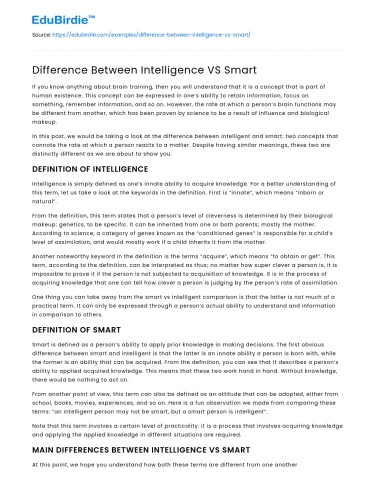If you know anything about brain training, then you will understand that it is a concept that is part of human existence. This concept can be expressed in one’s ability to retain information, focus on something, remember information, and so on. However, the rate at which a person’s brain functions may be different from another, which has been proven by science to be a result of influence and biological makeup.
In this post, we would be taking a look at the difference between intelligent and smart; two concepts that connote the rate at which a person reacts to a matter. Despite having similar meanings, these two are distinctly different as we are about to show you.
Save your time!
We can take care of your essay
- Proper editing and formatting
- Free revision, title page, and bibliography
- Flexible prices and money-back guarantee
DEFINITION OF INTELLIGENCE
Intelligence is simply defined as one’s innate ability to acquire knowledge. For a better understanding of this term, let us take a look at the keywords in the definition. First is “innate”, which means “inborn or natural”.
From the definition, this term states that a person’s level of cleverness is determined by their biological makeup; genetics, to be specific. It can be inherited from one or both parents; mostly the mother. According to science, a category of genes known as the “conditioned genes” is responsible for a child’s level of assimilation, and would mostly work if a child inherits it from the mother.
Another noteworthy keyword in the definition is the terms “acquire”, which means “to obtain or get”. This term, according to the definition, can be interpreted as thus; no matter how super clever a person is, it is impossible to prove it if the person is not subjected to acquisition of knowledge. It is in the process of acquiring knowledge that one can tell how clever a person is judging by the person’s rate of assimilation.
One thing you can take away from the smart vs intelligent comparison is that the latter is not much of a practical term. It can only be expressed through a person’s actual ability to understand and information in comparison to others.
DEFINITION OF SMART
Smart is defined as a person’s ability to apply prior knowledge in making decisions. The first obvious difference between smart and intelligent is that the latter is an innate ability a person is born with, while the former is an ability that can be acquired. From the definition, you can see that it describes a person’s ability to applied acquired knowledge. This means that these two work hand in hand. Without knowledge, there would be nothing to act on.
From another point of view, this term can also be defined as an attitude that can be adopted, either from school, books, movies, experiences, and so on. Here is a fun observation we made from comparing these terms: “an intelligent person may not be smart, but a smart person is intelligent”.
Note that this term involves a certain level of practicality. it is a process that involves acquiring knowledge and applying the applied knowledge in different situations are required.
MAIN DIFFERENCES BETWEEN INTELLIGENCE VS SMART
At this point, we hope you understand how both these terms are different from one another judging by their definitions. In this section, we would throw more light on their specific differences with regards to the method of acquisition, qualification, and nature.
MODE OF COMPARISON INTELLIGENCE SMART
Definition One’s innate ability to acquire knowledge A person’s ability to apply prior knowledge in making decisions
- Refers to Intellect of a person Intellect, certain reactions, and appearance of a person
- Method of acquisition Inherited from the parent by genetic transfer Acquired by external influence like books, experience, movies, and so on
- Quantification Measured by IQ tests Not measurable
- Nature Not practical Mostly practical
CONCLUSION
Finally, we would conclude by saying this about the intelligence vs smart comparison; the former may be appreciated by people, but it does not bring any benefits per se. Every knowledge assimilated cannot be of help to anyone, except it is practically expressed in certain situations, in which case, the person is said to be smart. You may want to know that the former can be in different forms like mathematical, linguistics, music, spatial, interpersonal, and so on.






 Stuck on your essay?
Stuck on your essay?

